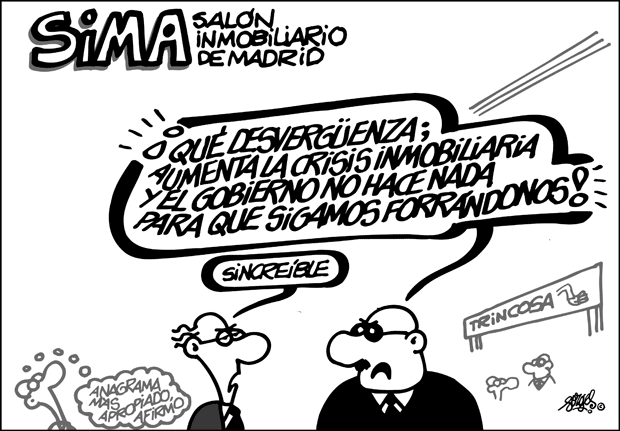Crisis, what crisis?
I don’t want to be ironic but for now I think we are in a recession, a hard recession (you can see in a dictionary of Economics what's a crisis and what's a recession). Why do I say this affirmation? Well, if we attend to the stats, we can see our economy is still growing but there are a lot of symptoms of tiredness or even free fall in housing sector. As I wrote last summer about this problem and about this threat, nobody has done anything because of the general elections. The economic situation needed to be ideal for electors (for the government's interest). It’s not (yet) a disaster but the government must intervene A.S.A.P.. But there aren’t so many possibilities and the global situation is getting worst faster and faster: higher and higher prices on petrol, food and raw materials; USA is bordering the crisis and their situation is very concerning (and there are general elections too); other countries are losing their confidence in their economic situation (UK, Ireland) or stay in stagnation (Italy or Portugal); the Euro is very high and this can be good for imports (overall petrol and raw materials) but very bad for exports (that’s the main problem for Italians nowadays); and the interest rates are increasing month by month (Libor, Euribor), so the European economies are going to get a big cold with these conditions. Besides, the European central banks sold their gold reserves last summer in a almost understanding operation (even almost suspicious for my skeptical mind), so they spent those necessary resources currently for a future stabilization.
This reality points to a kind of stagflation (stagnation + inflation) like in the 70’s: these situations share a lot of similarities but the international actors are totally different and their behaviour predictably are going to be correct this time (Latin America, China, India, Russia, Middle East countries…), so they won't take so much borrowed money. But today there are two main currencies (Euro and USD) so there are two different interest rates and these countries can play with their reserves.
But what’s the origin of this recession (in Spain)? I think its origin comes from the housing sector and its important importance in the national economy. This last prosper period has based on this sector and neither populists nor socialists haven’t been able to regulate this growth in order to control the housing market and replace progressively this important sector in the GDP for other new sectors that could retake the national development. But I understand that they’re focused on other political problems as 11-M or ETA, and the economy was in a second place (as always), so this can be another delay factor. They haven't looked for a long-term prosperity and this must be another lesson to learn when we can choose our politicians again. Neither the myopia of PP nor the "flower power" politics of PSOE are going to solve the problems.

Click to enlarge
And we can write a lot of things about opposition’s interests in this “crisis”, the government inconsistency or about the consequences, but for now it’s quite soon. The first consequence is the increasing unemployment rate, the hard drop of the housing market, the decreasing surplus, the lack of government’s performance, the demagogic use of this recession by the opposition (without direct and clear solutions because there aren't magical and immediate solutions) and a lot of strikes. Differently to the last economic fluctuations, the general environment is clearly negative and internally, the leadership of the housing sector is falling down because the housing bubble has blown up finally and as free market, it’s suffering the adjustment. But, this is really the best new we can hear because it’s coming back to its fair place although there are a lot of people affected by its consequences. We'll see in few months where will be.
I will see you soon here, in Nueva Dialectica!!

Click to enlarge
